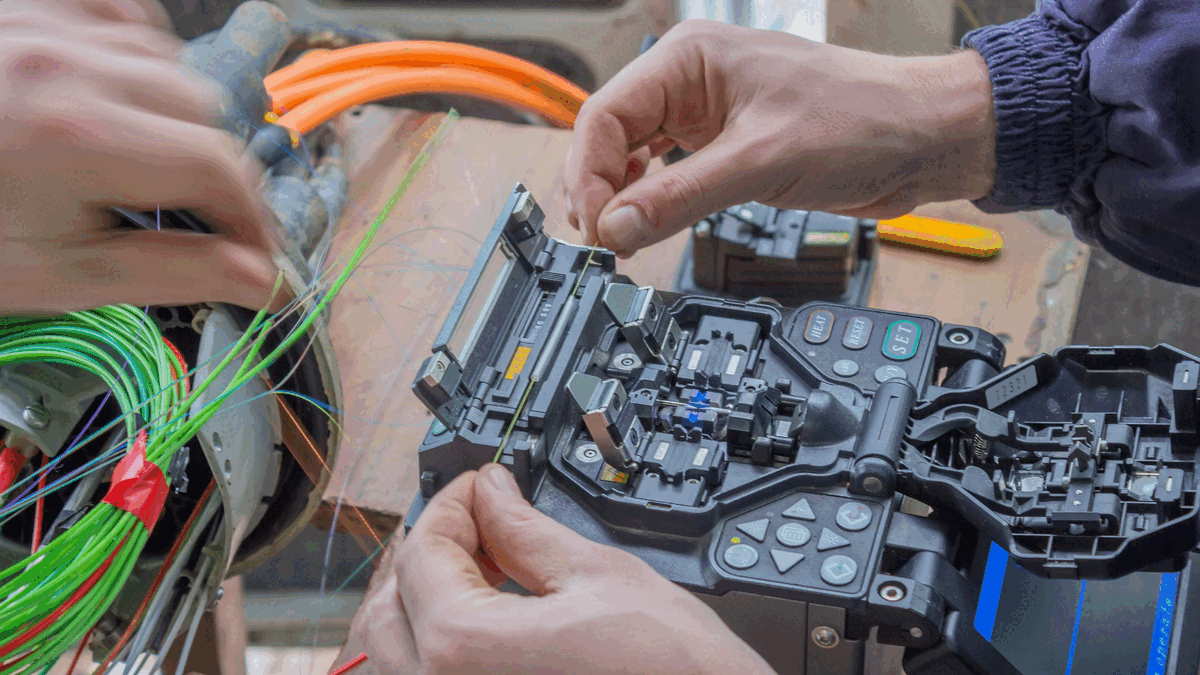Network Cable Installer Apprenticeship
Install, terminate, test, and certify copper and fibre optic network infrastructure to national and international industry standards.

Course Overview
The Level 3 Network Cable Installer Apprenticeship trains you to install, terminate, test, and certify network cable infrastructure that forms the communications backbone of the digital world. You will work with copper cables—widely used to connect computers, servers, and devices in offices, hospitals, and data centres—as well as fibre optic cables that link floors, buildings, cities, and even countries, including high-speed broadband to homes. The programme covers both Inside Plant (ISP) installations within buildings and Outside Plant (OSP) work between sites. Projects range from a single outlet in a customer's premises to thousands of connections in a new office block or fibre runs spanning many kilometres. You will also learn to contribute to your organisation's cyber security strategy by ensuring physical security and maintaining data confidentiality, integrity, and availability. This physically active role requires lifting and moving equipment, interpreting customer requirements accurately, and delivering excellent, consistent service to high quality standards.
Professional Recognition
- Network Cable Installer Certificate
- Full member of the Institute of Telecommunications Professionals
- ECS Network Infrastructure Installer Gold Card
Entry Requirements
- Employed in a network cable installation role
- Working at least 30 hours per week
- Right to work in England
- Not in full-time education
Career Outcomes
This apprenticeship can lead to roles such as:
Programme Details
- Programme Length
- 8 to 13 months
- Off-the-Job Training
- 348 hours minimum
- Programme Level
- Level 3
- Delivery Method
- One-week copper block course, one-week fibre block course, plus blended learning through online learning and 1-to-1 mentoring.
- End Point Assessment
- 1-day practical assessment and a professional discussion underpinned by a portfolio of evidence
Funding
Apprenticeship Levy paying employers can use their funds for this programme. Employers not paying the Levy can get up to 95% funding.
Interested in this programme?
Whether you're looking to start your apprenticeship journey or develop your team, we're here to help.
Benefits of the Network Cable Installer Apprenticeship
Benefits to Apprentices
- This apprenticeship programme offers apprentices a comprehensive learning experience in network cable installation and maintenance.
- They gain theoretical and practical knowledge in various modules, from Health and Safety to Cyber Security, enhancing technical proficiency and professional skills.
- The programme ensures apprentices are well-prepared for industry demands and future advancements, making them valuable assets.
Benefits to Employers
- Employers benefit from apprentices equipped with a diverse skill set, covering areas like copper and fibre optic cabling, quality management, and cyber security.
- This training results in a workforce capable of effectively managing network infrastructure complexities, meeting client expectations, and adhering to industry standards.
- Employers gain a competent, adaptable workforce that drives operational excellence and business growth.
How This Apprenticeship Fits Into Your Business
Skilled Installation
Access apprentices trained in copper and fibre network installation to meet high standards.
ECS Gold Card Eligibility
Enable apprentices to qualify for ECS Network Infrastructure Installer Gold Card.
Safety Focus
Instil a culture of health and safety compliance in cable installation practices.
Personal Growth
Nurture apprentice development in cyber security, documentation, and project completion.
Customer Centricity
Train apprentices to understand and meet customer requirements for quality installations.
Quality Assurance
Ensure adherence to standards and best practices, reducing communication link issues.
Watch: About This Apprenticeship
Frequently Asked Questions
Find answers to common questions about the Network Cable Installer Apprenticeship.
What is the Network Cable Installer Apprenticeship?
The Network Cable Installer Apprenticeship is a Level 3 programme that trains you to install, terminate, test, and certify copper and fibre optic network infrastructure to industry standards. You will work on projects ranging from single outlets to large-scale data centre installations.
What qualifications do I get from the Network Cable Installer Apprenticeship?
Upon completion, you receive the Network Cable Installer Certificate, become a full member of the Institute of Telecommunications Professionals, and become eligible for the ECS Network Infrastructure Installer Gold Card.
Is the Network Cable Installer Apprenticeship physically demanding?
Yes, the role involves lifting and moving equipment, working in various environments including offices, data centres, and outdoor locations. You should be comfortable with physical work and working at heights.
What is the difference between copper and fibre optic cabling?
Copper cables are widely used to connect devices within buildings, while fibre optic cables provide higher-speed connections over longer distances—linking buildings, cities, and even countries. This apprenticeship covers both technologies.
How does the Network Cable Installer Apprenticeship support cyber security?
Network installers work in data-sensitive environments and learn to contribute to their organisation's cyber security strategy by ensuring physical security and maintaining the confidentiality, integrity, and availability of data.
Get Started with the Network Cable Installer Apprenticeship
Whether you're looking to start your career or develop your team, we're here to help.
Not sure if this is the right apprenticeship for you?
Browse our full range of apprenticeship programmes or get in touch and we'll help you find the perfect fit.